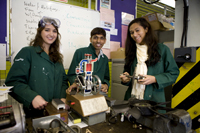 The metaphor of the "leaky pipeline" has been used to describe girls' attrition from science, technology, engineering, and mathematics (STEM). While girls do well in science and math courses in middle school, they are less likely to enroll in higher-level STEM courses in high school, thus few will choose these subjects for a college major, and even fewer will complete such a major or go on to pursue a STEM career. Maintaining our competitive edge in the global economy requires that we encourage persistence in these fields for all our students. Given the fact that girls and boys have a similar aptitude for these subjects, why are outcomes so different?
The metaphor of the "leaky pipeline" has been used to describe girls' attrition from science, technology, engineering, and mathematics (STEM). While girls do well in science and math courses in middle school, they are less likely to enroll in higher-level STEM courses in high school, thus few will choose these subjects for a college major, and even fewer will complete such a major or go on to pursue a STEM career. Maintaining our competitive edge in the global economy requires that we encourage persistence in these fields for all our students. Given the fact that girls and boys have a similar aptitude for these subjects, why are outcomes so different?
The SISTEM Study, officially called the Social-Ecological Study of Gender, Relationships, and High School STEM, is funded by the National Science Foundation. Its main goal is to increase understanding of the underlying factors behind the under-representation of girls and women in STEM fields. In addition, it will explore factors related to the lack of under-represented minority boys in STEM. The study will examine the multiple influences on urban girls' and boys' educational experiences and aspirations related to STEM study and career development by investigating the social relationships of students attending exam and/or science-themed high schools within a large urban school district.
A key feature of the SISTEM study is its focus on participants' relationships — not just their social networks but the specific characteristics of those networks and the particular functions the networks perform around supporting or thwarting STEM interest and participation. Another key feature is its focus on gender ideology as a possible explanation for the variability in girls' involvement in STEM. The increased knowledge generated by this study will inform ways to increase the participation of girls and other under-represented groups (e.g., racial and ethnic minorities, low-income youth) in sustained STEM study and employment.
Specific research questions include: How do the extent and type of STEM-relevant support provided by relationships in students' lives influence educational experiences and aspirations related to STEM study and career development? Do patterns of STEM influence differ by gender and race/ethnicity for urban public high school students? What types of support and influence best predict STEM persistence in high school?
Some recently published results include:
Porche, M. V., McKamey, C. L., & Wong, P. Y. (2009). Positive influences of education and recruitment on aspirations of high school girls to study engineering in college. Published conference proceedings from the Annual Meeting of the American Society for Engineering Education.
Porche, M. V., Noonan, A. E., Grossman, J. M., & Wong, P. Y. (2008). Key factors related to high school girls' interest and aspirations in engineering, science, and math. Published conference proceedings from the Annual Meeting of the American Society for Engineering Education.
WCW is collaborating on this study with Anne Noonan, Ph.D. of Salem State College (formerly with WCW), and with Peter Wong, Ph.D. of Tufts University and the Boston Museum of Science, as well as an advisory committee comprised of local experts in science education and workforce development.
For information on other WCW work on girls and science, see the Fairer Science project description.

